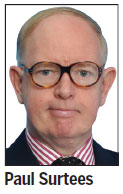The neediest cannot wait much longer for help
Updated: 2014-04-24 05:50
By Paul Surtees(HK Edition)
|
|||||||
There has been much recent public debate on the possibility of introducing a universal pension for Hong Kong people, as well as comments on our incredibly large financial reserves. Hong Kong is holding about HK$700 billion in reserves and the Hong Kong Monetary Authority is holding over a billion more. These colossal reserves (held by such a relatively small city) are the envy of many foreign countries, most of them mired in debt.
Holding huge financial reserves in government coffers does not mean that this is the government's money. It is wealth accumulated from money collected from the people. The government is merely the custodian on behalf of the whole populace. As they represent hundreds of thousands of dollars held on behalf of every local person, so the question must be asked if such huge reserves of financial resources are being put to good use for the deserving.
It makes sound economic sense to have reasonable reserves, if that is possible, as a buffer against tough economic times, or "rainy days" as our Financial Secretary puts it. However, while holding the equivalent of a couple of years of average government income would be a wise precaution, Hong Kong's public piggy bank is grossly fuller than that. Many argue that this city is holding way too much in reserves, whilst being too penny-pinching to a judicious proportion of these resources to improve the lives of our more needy residents, hundreds of thousands of them living below the poverty line, and the elderly.

The building up, maintaining and passing-on of enormous financial reserves should not be seen as an end in itself. Rather, priorities should be established for the utilization of at least part of these reserves. The recently announced poverty-alleviating measures will go some small way to helping the working poor. But too little is offered to a large section of the Hong Kong population that is still suffering: the elderly poor.
It is appalling that over half of the over-65s in this city are living below the poverty line. That's because most of them have little or no pension to sustain them in comfort and dignity. They were the ones who throughout their earlier busy working lives contributed their labors towards achieving the economic success that Hong Kong enjoys today. That they were not in those earlier days compensated sufficiently for their labors, by the provision of a decent pension scheme, was an oversight of earlier governmental financial authorities - and by their stingy employers of the period. This city now has the financial might to finally address those earlier oversights, and it must start repaying them as soon as possible now that they are in their twilight years.
Funding the introduction of a universal pension, for all established Hong Kong citizens aged over 65, is well within this city's means. Such provision would use up a large chunk of those reserves - but then, what are those reserves really for, if not to support the people of Hong Kong? The costs of those other recently announced enhanced anti-poverty measures will not even dig as deep as one part in 500 of the accumulated assets; so Chief Secretary Carrie Lam is right to state that Hong Kong can well afford to introduce them - and, indeed, to spend much more besides!
The argument that such colossal financial reserves must be passed on, untouched, to the next generation is spurious. To have two-thirds of our elderly citizens living in abject poverty, all for the sake of passing on gigantic reserves of untouched capital to future generations, is morally questionable. The next generations, including the yet unborn, are certainly not more deserving of this money than are today's elderly poor. Eventually, a lifetime's MPF payments may support future generations of pensioners; unfortunately, today's elderly do not have that to fall back on.
Future generations can shift for themselves in these matters - meaning they can find ways to increase the government's income, rather than relying on capital accumulated (and little-spent) in the time of their hard-up grandparents. For example, many of our richest have cannily built up their enormous wealth from property. The government could impose an especially high tax on such unearned income. That would generate vast amounts to refill those governmental coffers partially emptied by funding this proposed universal pension scheme.
Were even a part of Hong Kong's vast financial reserves to be redistributed to the most needy - the elderly poor - a more equitable and harmonious society would result. Finally, perhaps it's worth remembering what a wag once said: "I'm for helping the elderly. I'm going to be old myself someday."
The author is a Hong Kong-based commentator, university lecturer and adviser to the Hong Kong Federation of the Blind.
(HK Edition 04/24/2014 page9)